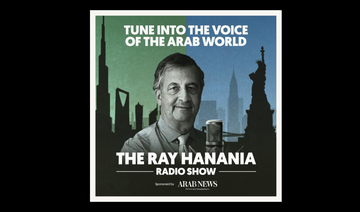CHICAGO: Saudi Arabia’s innovative efforts to “Go Green” to protect the environment and sustain its natural resources are moving forward at unprecedented speeds, Rawan Radwan, a deputy section editor and writer for Arab News, explained Wednesday.
During an appearance on “The Ray Hanania Show,” Radwan detailed not only the many greening initiatives that Saudi Arabia has underway, but also touched on how the Gulf country is changing negative Western perceptions of Arabs, women and more through promoting a better understanding.
Radwan detailed dual green initiatives to plant 10 billion trees in Saudi Arabia and 50 billion trees in the Middle East region, explained a new program launched to assist businesses called the “Made in Saudi Arabia Initiative,” confronted misconceptions regarding Western stereotypes about the lives of women in the Arab World and described the adaptation of religious practices in the wake of the COVID-19 pandemic.
“It’s a movement that has been happening for quite some time now,” Radwan, Arab News deputy section editor and regional correspondent, said of the many programs.
Detailing Saudi Arabia’s “Go Green” initiative, Radwan added that municipalities and regional governorates came together to develop a strategy to plant 10 billion trees in the country and almost 50 billion trees in the region.
“Saudi municipalities and regional governors are working together to populate the country with billions of trees to combat CO2 emissions, going green,” Radwan said.
“As a global player, it (Saudi) is expanding more regionally. That’s why we have the Middle East initiative as well. Different governments have shown much interest.”
Radwan said that Saudis have recognized what the planting of trees can do to preserve and expand the country’s water resources.
“‘Going Green’ is what we need to combat climate change, decrease CO2 emissions and ensure that we play our part in protecting the environment,” Radwan said, noting that the program excludes the planting of palm trees, which consume high levels of water to survive.
“The focus is to find environmentally friendly trees that don’t need to consume a lot of water and that don’t need a lot of care. Palm trees do need a lot of care and a lot of water.”
The “Made in Saudi Initiative,” Radwan said, is a program to boost the country’s small to medium sized businesses and increase sales of domestic products. More than 850 businesses have signed up since the program was launched 10 days ago, she added.
“The program is basically to support Saudi firms. It is to support Saudi small and medium enterprises and micro companies. It also basically promotes the national identity,” Radwan said.
“We want companies to come in and invest in the areas. We want Saudi companies to also expand their products and ensure that they not only survive domestically, but also that they can expand globally.”
Radwan said that the enthusiasm to take part “tells you that there is a good product out there that can be promoted, and can be available for international consumers and domestic consumers alike.”
She added that one challenge always confronting the Arab and Islamic worlds is the Western perception of Arab culture.
“It’s something a lot of people don’t understand. Saudi is very diverse,” Radwan said when asked about the challenges she faces as a woman.
“We have women in every given field. It has been a phenomenal time. The past couple of years there has just been a boost in women in different managerial positions. Someone like me who has been working at Arab News since 2012 has always found support. It’s not something new.”
Radwan added that, like many other nations, Saudi Arabia has had to confront the challenges caused by the COVID-19 pandemic, especially as more than 1 billion Muslims prepare for Ramadan later this month.
“Last year was a very difficult year as the pandemic hit and Saudi Arabia went into lockdown,” Radwan said.
“Prayers and worshippers were basically stopped everywhere. The Two Holy Mosques are the two most sacred sites in Islam and for that to happen really hit a nerve. A lot of Muslims across the world felt that was the most difficult thing to ever happen in their lives. Who would have thought that?”
Saudi Arabia implemented a structure system to manage Ramadan participation and preserve health-related protections, including social distancing and the wearing of face masks.
Radwan said that there is a new system that allows pilgrims and worshippers at the two sites to schedule their Umrah prayers. She added that in addition to scheduling their prayer visits, pilgrims and worshippers must be vaccinated or show that they have recently recovered from a COVID-19 infection.
“The reason why they are doing this is to ensure the safety of the pilgrims and the worshippers attending the mosque prayers, either at the Prophet’s Mosque in Madinah or the Grand Mosque in Makkah,” she said.
“The Ray Hanania Show,” which is sponsored by Arab News, is broadcast every Wednesday morning at 8 a.m. EST on the US Arab Radio Network on WNZK AM 690 in Detroit and on WDMV AM700 in Washington D.C. People outside of the two regions can watch the live broadcast of the radio show on social media at facebook.com/ArabNews.












